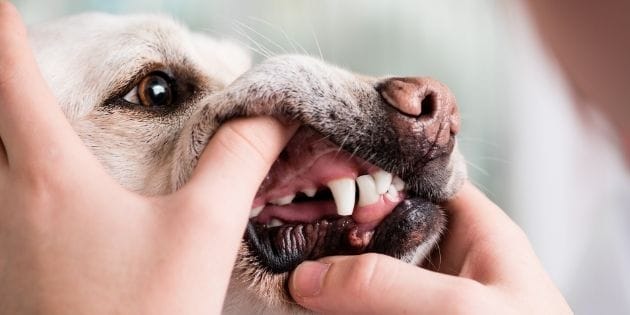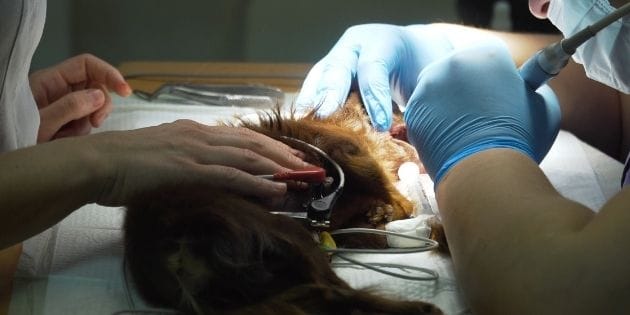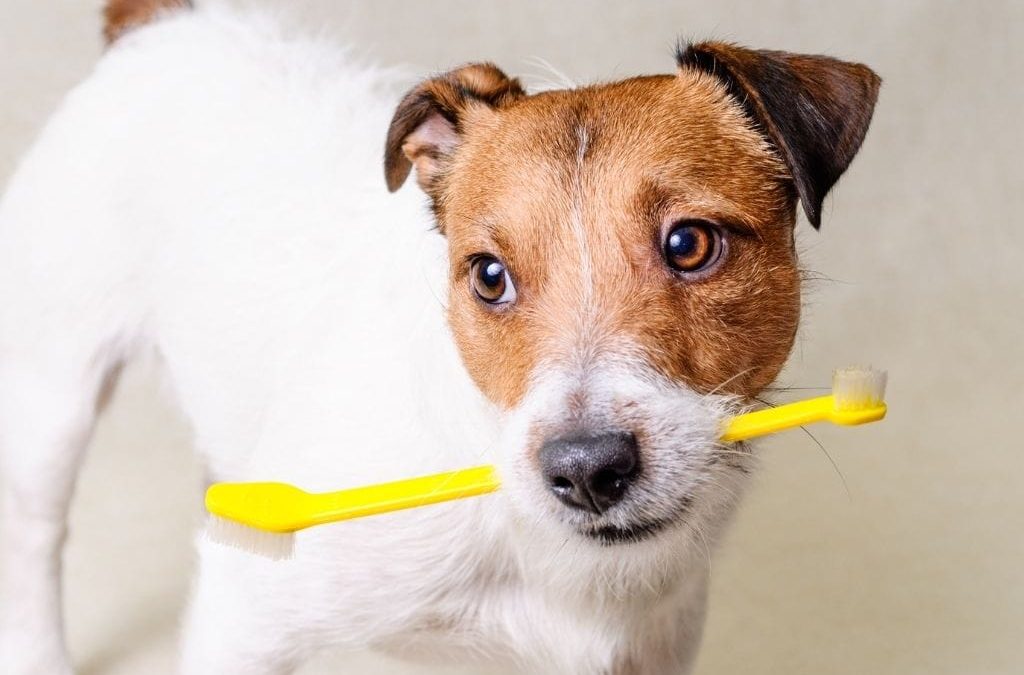Dental health is a huge part of your dog’s wellness. By the age of 3, most dogs will already show signs of periodontal disease. This can have a huge impact on their overall health.
What is Periodontal Disease?
Periodontal Disease (also called Gum Disease) is an infection that support and surround a dog’s teeth. Without treatment, the infection can destroy the bone that supports the teeth which can lead to tooth loss. Just as in humans, poor dental health can lead to serious health problems.
Some of the symptoms of periodontal disease in your dog include:
- Red or puffy gums
- Bleeding gums during brushing or chewing
- Bad breath
- Gum recession
- Loose teeth
- Pus may ooze from around teeth
Behavioral changes may include:
- Not able to tolerate brushing teeth due to pain
- Chewing different or smacking their gums
- Flinch or pull away when inspecting teeth
- Acting more withdrawn or aggressive
- Reluctant to play with chew toys.

4 Reasons Dental Care for Your Dog is Critical

Preventing Tooth Loss
Infection can cause damage to the structure supporting a dog’s teeth. Keeping up with your dog’s dental needs will ensure that those structures remain intact and their teeth remain strong and healthy.

Preventing Oral Pain
Dental issues can be quite painful for your dog as it is in humans. Good dental healthy will avoid nasty oral pain.

Preventing Bad Breath
If your dog has a healthy mouth then bad breath (halitosis) won’t be a problem. If your dog’s breath makes you cringe, it’s time to look into dental care.

Preventing Organ Damage
As in humans, dental disease can lead to much more serious health issues. Bacteria in the gums can enter the bloodstream. This bacteria can them reach the heart, kidneys and live causing damage that can be very serious.
What is involved in a professional teeth cleaning?
Prior to a professional dental cleaning.
A dental exam by your veterinarian is the first step for your dog’s dental health. The veterinarian will give a do an oral assessment to look for signs of tartar build up and the health of the gum line. They will also review any procedures that are likely to be required prior to a dental cleaning. Your veterinarian may perform blood tests to ensure that kidney and liver function are at acceptable levels prior to anesthesia.
During the dental cleaning.
During the dental cleaning visit, your dog will be placed under general anesthesia. There will be a thorough examination to the teeth and gums. The veterinarian will not any abnormalities and use a dental probe to evaluate gum bleeding and pockets where food can accumulate and cause decay. It is difficult to know the extent of the disease, if any, until the exam is performed. Because of this, some procedures may not be decided upon until after the exam. The veterinarian may contact you during the exam to discuss issues that need more urgent attention. Either way, a course of action is decided and the veterinarian moves on to the cleaning.
The teeth will be cleaned will consist of tooth scaling by both hand and ultrasonic scalers. This is done to remove plaque both above and below the gum line. The tartar below the gum line needs to be thoroughly cleaned as this is the most significant cause of periodontal disease. After the scaling is complete, the teeth are polished to help reduce future build-up of plaque.

What will a dental cleaning cost?
Some clinics charge by the hour and some charge by the procedure. The range can vary. A standard cleaning generally cost a few hundred dollars. However if there is significant disease that requires, oral radiographs or tooth extraction the cost could be anywhere form $2,000-$3,000. This is why it’s important to stay ahead of the periodontal disease with regular dental care.
How Often Should You Get Your Dog’s Teeth Professionally Cleaned?
Most veterinarians will recommend your dog’s teeth be professionally cleaned every 6-12 months. With very good dental care at home, then you may be able to stretch that time frame a little further.
Some smaller breeds such as Dachshunds and Chihuahuas have more crowded teeth with leads to increased plaque buid-up. These breeds may need more frequent dental care.


Regular brushing, dental chews, and professional cleanings can help prevent tooth decay and gum disease in dogs, reducing the risk of oral pain, infections, and tooth loss.